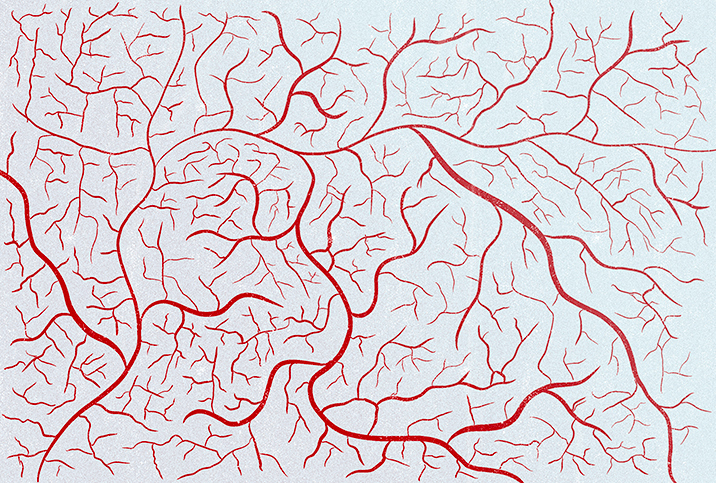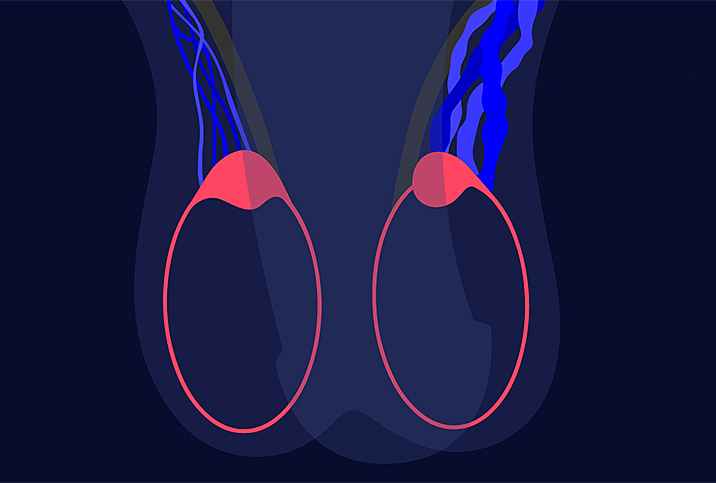Are There Nonsurgical Treatments for Varicoceles?

Varicoceles are a relatively common testicular condition of the veins in the scrotum, affecting around 15 to 20 percent of adolescent boys and adult men.
The veins in the scrotum become enlarged and snarled, presenting an appearance similar to varicose veins in the legs and forming a mass above one or both testicles, most often the left one. For clinicians diagnosing varicoceles—and the patients hearing that diagnosis—the phrase "like a bag of worms" is often a disturbing description of the condition.
Varicoceles are often painless and may be left untreated for some time, which is not to say they are completely harmless. There are certain risks involved for men who leave varicoceles unrepaired.
So what are the options for men and boys dealing with a "bag of worms" for a scrotum? Some options don't involve going under the knife. Here are a few aspects to consider when deciding on treatment for varicoceles.
What are varicoceles?
Varicoceles develop in the veins that carry blood away from the testicles back toward the heart. While these veins typically operate with a valve system that keeps the blood moving in the correct direction, sometimes the blood can back up when the valves aren't operating optimally. This causes blood to pool in the problematic veins, dilating and swelling them, resulting in a varicocele.
What are the consequences of varicoceles?
Varicoceles are often relatively painless. But for some men, the swelling expands to the point of discomfort and even pain. Other potential consequences posed by varicoceles include:
- Fertility. Even if your varicoceles are not painful, they may still need to be addressed due to fertility concerns. Four in 10 men with fertility problems have varicoceles, although it's not clear exactly how they affect male fertility. One theory is that the additional blood pooling near the testicle may keep its temperature too high for sperm production. However, varicoceles are not conclusively believed to cause infertility but are "clearly associated" with it, according to a World Health Organization study.
- A smaller testicle. Teenagers who have varicoceles are especially encouraged to keep an eye on the size of their left testicle, as varicoceles are associated with slower growth.
- Lower testosterone. Due to the way varicoceles appear to affect the function of one or both testicles, it's believed that testosterone production may also be affected.
What does varicocele surgery entail?
The idea of surgery for dealing with varicoceles is off-putting for some men, especially if their varicoceles aren't painful. Varicocele surgery is an outpatient procedure, but one that requires general anesthesia and involves an incision in the groin or laparoscopy. Although you can usually go home the same day, you might be recovering for up to two weeks, and most surgeons recommend abstaining from sex for at least four weeks.
What are nonsurgical options to treat a varicocele?
Alternatives to varicocele surgery include doing nothing if fertility and discomfort are not major concerns.
If treatment is required, a minimally invasive procedure called varicocele embolization is growing in popularity. It's considered the least invasive form of varicocele intervention, requiring a tiny needle stick and local anesthesia. The doctor uses a coil or a balloon to block, or embolize, the affected vein and divert the blood away, according to Johns Hopkins Medicine.
This procedure is effective in 90 percent of patients, according to a review in the Asian Journal of Andrology.
Embolization is also thought to be safer than more invasive surgery in terms of potential side effects. Surgical approaches risk damage to the spermatic cord and testicular artery, and the recovery time from an embolization procedure is shorter than with surgery.
Conclusions
It should be noted that varicoceles have a strong genetic component. If you have a close relative who has had a varicocele, you may be at increased risk of developing one.
Procedures to repair varicoceles don't always work, and varicoceles may return even if treatment was successful. More men and parents of adolescents with varicoceles are looking at embolization as an alternative to invasive surgery.
Given the potentially serious consequences of untreated varicoceles, the condition at least warrants close medical supervision and frequent checkups, even if you decide to leave it untreated.


















